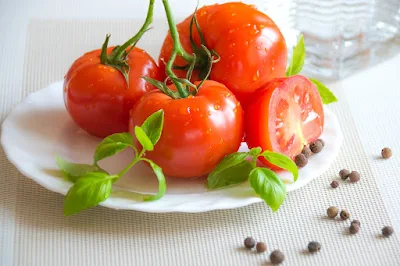Top 10 Vegetables for a Healthier Life: Boost Longevity Naturally (Science-Backed Secret)
In the pursuit of a longer, healthier life, the importance of a balanced diet is undeniable. Today, we’re going to delve into the top 10 amazing vegetables that can supercharge your lifespan. These nutritional powerhouses are loaded with essential nutrients and have been associated with the prevention of various health issues, including heart disease, cancer, and diabetes.
1. Broccoli
Broccoli is a nutrient-rich vegetable, packed with antioxidants like vitamin C and glucoraphanin, which your body converts into a potent antioxidant called sulforaphane. These compounds may help reduce the risk of heart disease and certain types of cancer.
Broccoli is a nutrient-rich vegetable that offers numerous health benefits
1. Rich in Vitamins and Minerals: Broccoli is loaded with a wide array of vitamins, minerals, fibre, and other bioactive compounds. One cup (91 grams) of raw broccoli packs vitamin C, vitamin A, vitamin K, vitamin B9 (Folate), potassium, phosphorus, and selenium.
2. Contains Potent Antioxidants: Broccoli contains high levels of glucoraphanin, a compound that is converted into a potent antioxidant called sulforaphane during digestion. It also contains measurable amounts of the antioxidants lutein and zeaxanthin¹.
3. Promotes Heart Health: The antioxidants in broccoli may help reduce inflammation, improve blood sugar control, boost immunity, and improve heart health.
4. May Prevent Certain Types of Cancer: The sulforaphane in broccoli has been found to have anti-cancer properties.
5. Supports Digestive Health: Broccoli is high in fibre, promoting gut health and aiding digestion.
6. Boosts Immune System: The vitamins A and C in broccoli play a crucial role in immune function, helping to combat diseases and infections¹².
2. Spinach
Spinach is high in vitamin K, which plays a vital role in bone health and blood clotting. It’s also rich in dietary fibre, which can help manage diabetes by stabilizing blood sugar levels.
Spinach is a nutrient-packed leafy green vegetable that offers numerous health benefits:
Rich in Vitamins and Minerals: Spinach is filled with a variety of vitamins, minerals, fibre, and other bioactive compounds. It provides an impressive amount of vitamin K, vitamin A, and vitamin C.
High in Antioxidants: Spinach contains antioxidants like kaempferol, quercetin, myricetin, and isorhamnetin, also known as flavonoids. These compounds may help protect against cancer, cardiovascular, and inflammatory diseases.
Supports Digestive Health: Spinach is high in insoluble fibre, which adds bulk to stool as food passes through your digestive system. This may help prevent constipation.
Promotes Heart Health: The compounds found in spinach could reduce oxidative stress and positively influence gene expression in metabolism and inflammation. This may help curb chronic diseases, including heart disease.
Boosts Brain Health: The anti-inflammatory effects of spinach make it a key contender for protecting the brain, specifically in terms of ageing.
Supports Eye Health: Spinach is rich in lutein and zeaxanthin, compounds linked to improved eye health.
Incorporating spinach into your diet, whether raw or cooked, can contribute to a healthier life.
3. Kale
Kale is one of the most nutrient-dense foods on the planet. It’s loaded with antioxidants like quercetin and kaempferol. These substances have been found to have heart-protective, blood pressure-lowering, anti-inflammatory, anti-viral, and anti-cancer effects.
Kale is a nutrient-dense leafy green vegetable that offers numerous health benefits:
Rich in Vitamins and Minerals: Kale is filled with a variety of vitamins, minerals, fiber, and other bioactive compounds. It provides an impressive amount of vitamin K, vitamin A, vitamin C, and manganese.
High in Antioxidants: Kale contains antioxidants like beta-carotene, vitamin C, as well as various flavonoids and polyphenols. These compounds help counteract oxidative damage by neutralizing free radicals in the body.
Supports Digestive Health: Kale is high in fiber, which adds bulk to stool as food passes through your digestive system. This may help prevent constipation.
Promotes Heart Health: The compounds found in kale could reduce oxidative stress and positively influence gene expression in metabolism and inflammation. This may help curb chronic diseases, including heart disease.
Boosts Brain Health: The anti-inflammatory effects of kale make it a key contender for protecting the brain, specifically in terms of aging.
Supports Eye Health: Kale is rich in lutein and zeaxanthin, compounds linked to improved eye health.
Incorporating kale into your diet, whether raw or cooked, can contribute to a healthier life.
4. Bell Peppers
Bell peppers are an excellent source of vitamin A and vitamin C. These vitamins play a crucial role in immune function, helping to combat diseases and infections.
Rich in Vitamins and Minerals: Bell peppers are packed with a variety of vitamins and minerals. They are particularly high in vitamin C, vitamin A, vitamin B6, folate, and potassium.
High in Antioxidants: Bell peppers contain antioxidants like beta-carotene, which your body converts into vitamin A. They are also rich in vitamin C, both of which help neutralize harmful free radicals in the body.
Supports Digestive Health: Bell peppers are a good source of fiber, which aids in digestion and helps maintain a healthy digestive system.
Promotes Heart Health: The compounds found in bell peppers may reduce oxidative stress and inflammation, which can help prevent heart disease.
Boosts Immune System: The high content of vitamin C in bell peppers supports a healthy immune system, helping your body fight off infections and diseases.
Supports Eye Health: Bell peppers, especially the red variety, are rich in beta-carotene and vitamin A, which are essential for good eye health.
Aids in Metabolism: Bell peppers contain vitamin B6 and folate, which are essential for the metabolism of proteins, fats, and carbohydrates.
Incorporating bell peppers into your diet, whether raw or cooked, can contribute to a healthier life.
5. Carrots
Carrots are rich in beta-carotene, a compound your body converts into vitamin A. This nutrient promotes good vision and is important for growth, development, and immune function.
Rich in Vitamins and Minerals: Carrots are packed with a variety of vitamins and minerals. They are particularly high in vitamin A, which your body converts into beta carotene, and they also provide a good amount of fiber, vitamin K1, potassium, and antioxidants.
Improves Vision and Eye Health: Carrots are well-known for their ability to improve vision and eye health. This is due to their high content of beta carotene, lutein, and zeaxanthin, which help remove free radicals from the cells of the eye, reducing oxidative stress and damage to the retina.
Lowers Cholesterol Levels: Beta carotene in carrots is associated with a reduced risk of atherosclerosis, which is the accumulation of fat in the blood vessels. Consuming beta-carotene-rich carrots is beneficial for overall health.
Reduces the Risk of Heart Diseases: The antioxidants in carrots can reduce the presence of free radicals, thus reducing the overall risk of heart diseases. Drinking carrot juice has been shown to reduce systolic blood pressure and increase antioxidant capacity in the body.
Aids in Weight Loss: Regular consumption of carrots as part of a healthy diet may help with weight reduction. Carrots are rich in soluble fiber, which alters blood glucose and cholesterol levels and brings about satiety, reducing the risk of overeating.
Supports Digestive Health: Carrots are a good source of fiber, which aids in digestion and helps maintain a healthy digestive system.
Incorporating carrots into your diet, whether raw or cooked, can contribute to a healthier life.
6. Beets
Beets are high in folate and manganese. The betalain pigments in beets have been associated with lower levels of inflammation and oxidative stress, which can lead to chronic diseases like heart disease and cancer.
Beets are a root vegetable that offer numerous health benefits:
Rich in Vitamins and Minerals: Beets are packed with a variety of vitamins and minerals. They are particularly high in folate, manganese, and copper.
High in Antioxidants: Beets contain compounds called betalains, which have powerful antioxidant effects and can help reduce inflammation. Beets are also rich in nitrates, which reduce inflammation by removing harmful compounds from your bloodstream.
Promotes Heart Health: The nitrates in beets don’t just reduce inflammation, they also improve heart health. Nitrates have been shown to reduce high blood pressure. Beets are also naturally low in cholesterol and fat, which makes them a good option for people concerned about heart disease or stroke.
Boosts Energy: Studies have shown that the nitrates in beets help mitochondria, which are responsible for producing the energy your cells need to function, function better. Some athletes even consume beet juice before exercising to improve their performance.
Supports Digestive Health: With two grams of fiber per serving, beets are primed to help keep your digestive system regular.
Incorporating beets into your diet, whether raw or cooked, can contribute to a healthier life. However, one concern with eating beets is that eating a lot of beets may cause gout, an extremely painful condition caused by an increased uric acid level in your blood. The oxalates found in beets can increase your uric acid level, meaning that too many beets can lead to gout. To avoid this, stick to no more than a single half-cup serving of beets per day.
7. Garlic
Garlic has been recognized for its preventive and therapeutic properties in managing cardiovascular diseases. It helps lower blood pressure and cholesterol levels, reducing the risk of heart disease.
Garlic is a highly nutritious food that offers numerous health benefits:
Rich in Vitamins and Minerals: Garlic is packed with a variety of vitamins and minerals. It contains health-promoting nutrients like vitamin C, zinc, iron, potassium, magnesium, and vitamin K.
Contains Potent Medicinal Properties: Garlic is known for its medicinal properties. It forms sulfur compounds when you chop, crush, or chew a garlic clove. The most well-known compound is allicin, which is only briefly present in fresh garlic after you cut or crush it. Other compounds that may play a role in garlic’s health benefits include diallyl disulfide and s-allyl cysteine.
Boosts Immune System: Garlic may help boost your immune system. Research suggests that aged garlic extract can enhance your immune system and reduce systemic inflammation.
Supports Heart Health: Garlic has been recognized for its preventive and therapeutic properties in managing cardiovascular diseases. It helps lower blood pressure and cholesterol levels, reducing the risk of heart disease.
May Lower Your Cholesterol: Garlic may improve cholesterol levels, particularly in those with high cholesterol or diabetes.
Might Have Lower Blood Pressure: Garlic’s impact on immune health, along with its potential to reduce cholesterol levels, may also reduce blood pressure.
Incorporating garlic into your diet, whether raw or cooked, can contribute to a healthier life. However, it’s important to note that most studies found the benefits came from aged garlic extract or supplemental forms of garlic rather than the kinds of garlic used in cooking.
8. Tomatoes
Tomatoes are a great source of lycopene, an antioxidant that has been linked to a reduced risk of heart disease and cancer.
Rich in Vitamins and Minerals: Tomatoes are packed with a variety of vitamins and minerals. They are particularly high in vitamin C, potassium, folate, and vitamin K.
High in Antioxidants: Tomatoes are the major dietary source of the antioxidant lycopene, which has been linked to many health benefits, including reduced risk of heart disease and cancer.
Supports Heart Health: The antioxidants in tomatoes can reduce the presence of free radicals, thus reducing the overall risk of heart diseases.
May Lower Your Cholesterol: Tomatoes may improve cholesterol levels, particularly in those with high cholesterol or diabetes.
Might Have Lower Blood Pressure: Tomatoes’ impact on immune health, along with its potential to reduce cholesterol levels, may also reduce blood pressure.
Supports Digestive Health: Tomatoes are a good source of fiber, which aids in digestion and helps maintain a healthy digestive system.
Incorporating tomatoes into your diet, whether raw or cooked, can contribute to a healthier life. However, it’s important to note that most studies found the benefits came from aged tomatoes or supplemental forms of tomatoes rather than the kinds of tomatoes used in cooking.
9. Sweet Potatoes
Sweet potatoes are packed with vitamin A and fibre, helping to regulate blood sugar levels and support digestive health.
Rich in Vitamins and Minerals: Sweet potatoes are packed with a variety of vitamins and minerals. They are particularly high in vitamin A, vitamin C, and manganese.
High in Antioxidants: Sweet potatoes are rich in antioxidants that protect your body from free radicals. Free radicals are unstable molecules that can damage DNA and trigger inflammation. Free radical damage has been linked to chronic illnesses like cancer, heart disease, and ageing.
Promotes Gut Health: The fibre and antioxidants in sweet potatoes can be beneficial for gut health. Sweet potatoes contain two types of fiber: soluble and insoluble. Your body cannot digest either type. Therefore, fiber stays within your digestive tract and provides a variety of gut-related health benefits.
Supports Immune System: The phytochemicals in sweet potatoes include carotenoids, tocopherols (vitamin E), phenolic compounds, tannins, flavonoids, saponins, and anthocyanins. These chemicals help your body fight disease and boost your immune system.
May Have Anti-Cancer Properties: Research found that sweet potatoes have anticancer benefits. In one study, purple sweet potatoes inhibited the growth of certain types of cancer cells.
Supports Eye Health: Sweet potatoes are rich in polyphenolic compounds, which protect eye and retinal health. Studies have found that anthocyanins (found in sweet potatoes) have an anti-inflammatory response on the eye surface and can treat eye disease, including dry eye syndrome.
Boosts Brain Health: Another potential benefit of the antioxidants in sweet potatoes is its effect on memory. While human studies on this subject are lacking, some animal studies have found that sweet potatoes have memory-enhancing effects.
Incorporating sweet potatoes into your diet, whether raw or cooked, can contribute to a healthier life.
10. Brussels Sprouts
Brussels sprouts are high in fibre, vitamins C and K, and antioxidants. These nutrients can help prevent chronic diseases and improve overall health.
Rich in Vitamins and Minerals: Brussels sprouts are packed with a variety of vitamins and minerals. They are particularly high in vitamin K, vitamin C, and folate.
High in Antioxidants: Brussels sprouts are high in antioxidants, compounds that promote overall health and help prevent damage to cells.
Promotes Heart Health: The compounds found in Brussels sprouts may reduce oxidative stress and inflammation, which can help prevent heart disease.
Supports Healthy Blood Sugar Levels: Brussels sprouts are high in fibre, a nutrient that helps stabilize blood sugar. This can be particularly beneficial for individuals managing diabetes.
Supports Gut Health: The fibre in Brussels sprouts helps support your digestive health. While fibre is a critical nutrient in promoting regular bowel movements and a healthy balance of gut bacteria, most people don’t get enough. Adding vegetables like Brussels sprouts is an easy way to boost fibre intake and support your gut.
Supports Non-Heme Iron Absorption: Brussels sprouts contain a small amount of iron. However, they provide vitamin C, helping to enhance the bioavailability of non-heme (plant-derived) iron in your diet, which is more challenging for your body to absorb than heme (animal-derived) iron.
Incorporating these vegetables into your diet can significantly contribute to a healthier life and potentially boost your longevity. Remember, a balanced diet is just one piece of the puzzle; regular exercise, adequate sleep, and a positive mindset are equally important in promoting a wellness-focused lifestyle.






















Post a Comment